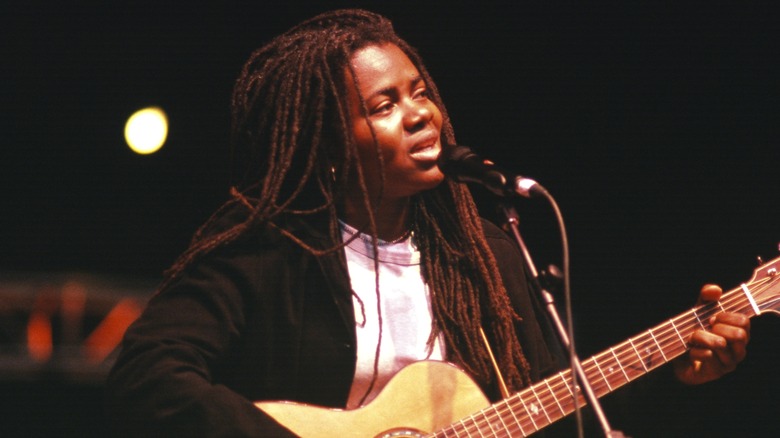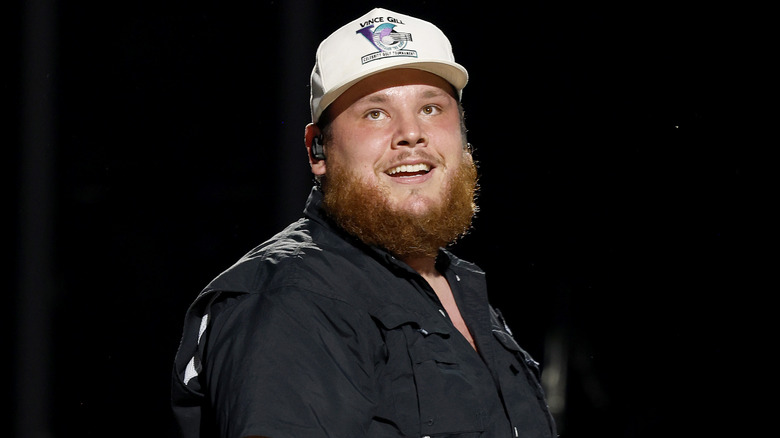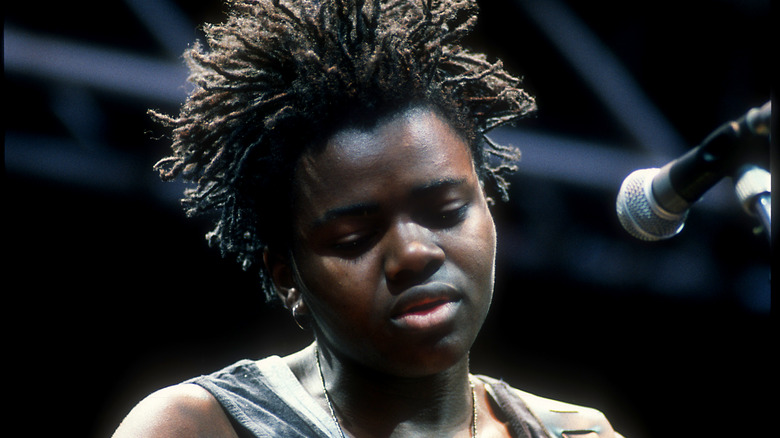Tracy Chapman Gets A Hefty Paycheck From Luke Combs' Cover Of Fast Car
Tracy Chapman has made an unexpected career comeback thanks to an unlikely source. Country singer Luke Combs' cover of "Fast Car" propelled Chapman back into the spotlight and introduced her nearly 36-year-old folk anthem to a whole new audience. Even better, Chapman's also enjoying a hefty windfall thanks to royalty payments from Combs' cover.
Chapman originally released the song in 1988. It shot to No. 6 on the Billboard 100 chart and became an instant classic. When Combs' version came out in 2023, it reached No. 2 on the Billboard 100 and stayed No. 1 on the Hot Country Songs chart for a month. Combs' placement made Chapman the first solo Black female writer to top the country chart since its inception in 1990. It also secured her the top spot on Billboard's Country Songwriters chart in June 2023. "I never expected to find myself on the country charts but I'm honored to be there," Chapman told Billboard. "I'm happy for Luke and his success and grateful that new fans have found and embraced Fast Car."
Although Combs was the one to thrust Chapman's "Fast Car" back onto the charts, he wasn't the first to cover the track. A slew of other musicians have lent their talents to the song, including Passenger, Sam Smith, Black Pumas, and Justin Bieber, among others. Still, Combs' version is by far the most successful — and lucrative. So, how much money has Chapman earned from Combs' "Fast Car" cover?
Luke Combs brings surprise windfall
Tracy Chapman owns the publishing rights for "Fast Car," meaning she bags a large chunk of the royalty profits. Billboard estimates Luke Combs' cover of the song resulted in around $500,000 in global publishing royalties between March 17 and June 8, 2023 alone. The bulk of the cash comprises on-demand streaming payments.
In addition, the success of Combs' cover reignited interest in Chapman's original version. Streaming and sales of Chapman's "Fast Car" leapt 44% following Combs' release, equating to somewhere in the region of $54,000. Elektra Records owns the recorded music rights, but Chapman's ownership of the publishing rights means she'll get around $13,000 of the $54,000. All in all, it's not a bad payday for a track that's all about living in poverty.
It's not just Chapman's bank balance that's enjoyed a significant boost, though. Her personal currency has also increased, with Google searches of Chapman's name tripling in the US between March 18 and June 3, 2023. Her star will likely continue to rise when she performs at the Grammys on February 4. Variety reported that Chapman would be making a surprise appearance at the award show, joining Combs on stage to perform "Fast Car" together. It's a rare occurrence, as Chapman has only made three on-camera performances since 2009. She last performed "Fast Car" at the 31st Grammy Awards ceremony 35 years ago. Chapman swept the board at the 1989 show taking home Best New Artist, Best Pop Vocal Performance, and Best Contemporary Folk Recording.
Luke Combs always loved Fast Car
Luke Combs was a huge fan of the original "Fast Car." "I never met Tracy," he told iHeart Country sharing he first heard the song while driving in his dad's car — on cassette, no less. "He would play it all of the time," Combs continued. "And that is one of the first songs I ever remember hearing, listening to, loving, being one of my favorite songs."
Combs' cover version is a smash hit. Still, that doesn't mean everybody is a fan. The Washington Post reporter Emily Yahr took great offense on behalf of Chapman, even though the singer has no issue. "As Luke Combs's hit cover of Tracy Chapman's 'Fast Car' dominates the country charts, it's bringing up some complicated emotions in fans & singers who know that Chapman, as a queer Black woman, would have an almost zero chance at that achievement herself," Yahr posted on X, formerly known as Twitter.
She has a point. Country music has a problematic relationship with artists of color and racism. In July 2023, the video for Jason Aldean's "Try That In A Small Town" caused a firestorm. It mashes up real-life footage of looting, rioting, and violence with clashes between Black Lives Matter protesters and cops, to the lyrics, "That might fly in a city. But try that in a small town. See how far you get." To hammer the point home Aldean performs in front of a Tennessee courthouse where a Black teen was lynched in 1927.



